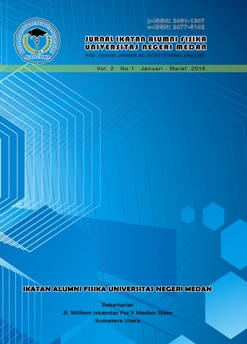PENGARUH MODEL PROBLEM BASED LEARNING (PBL) TERHADAP HASIL BELAJAR SISWA PADA MATERI POKOK SUHU DAN KALOR DI KELAS X SEMESTER II SMA NEGERI 11 MEDAN T.P. 2014/2015
DOI:
https://doi.org/10.24114/jiaf.v2i1.3736Keywords:
Problem Based Learning, Konvensional, Hasil BelajarAbstract
Penelitian ini bertujuan untuk mengetahui pengaruh model Problem Based Learning (PBL) terhadap hasil belajar siswa pada materi pokok Suhu dan Kalor di Kelas X Semester II SMA Negeri 11 Medan T.P. 2014/2015. Jenis penelitian ini adalah quasi eksperimen. Populasi dalam penelitian adalah seluruh siswa kelas X SMA Negeri 11 Medan. Penarikan sampel dengan cluster random sampling yaitu X-3 sebagai kelas eksperimen dengan pembelajaran Model Problem Based Learning sedangkan kelas X-4 sebagai kelas kontrol diajarkan dengan pembelajaran Konvensional. Instrumen yang digunakan pada penelitian adalah tes pilihan berganda 20 soal dari 25 soal yang telah diuji validitasnya. Data penelitian yaitu dalam bentuk hasil belajar .Untuk data hasil belajar diawali dengan uji normalitas dan homogenitas. Dengan data yang sudah telah berdistribusi normal dan homogen maka dilakukan uji statistik dengan uji t pada taraf signifikan α = 0,05. Nilai rata-rata hasil pretes kelas eksperimen adalah 39,5 dan kelas kontrol adalah 38,25. Dan nilai rata-rata postes kelas eksperimen 76,63 dan kelas kontrol 67,63. Hasil uji t satu pihak Ha di terima > (4,84 > 1,667), maka kesimpulan dari hasil uji t ada pengaruh model Problem Based Learning terhadap hasil belajar siswa pada materi pokok Suhu dan Kalor di kelas X semester II SMA N 11 Medan T.P 2014/2015.Downloads
Published
2016-03-14
Issue
Section
Articles
License
Authors who publish with this journal agree to the following terms:- Authors retain copyright and grant the journal right of first publication with the work simultaneously licensed under a Creative Commons Attribution License that allows others to share the work with an acknowledgement of the work's authorship and initial publication in this journal.
- Authors are able to enter into separate, additional contractual arrangements for the non-exclusive distribution of the journal's published version of the work (e.g., post it to an institutional repository or publish it in a book), with an acknowledgement of its initial publication in this journal.
- Authors are permitted and encouraged to post their work online (e.g., in institutional repositories or on their website) prior to and during the submission process, as it can lead to productive exchanges, as well as earlier and greater citation of published work (See The Effect of Open Access).

